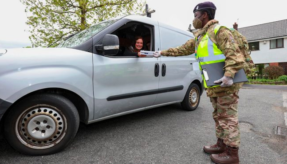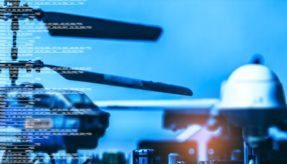
Writing for Defence Online, Peter Ford, Public Sector Industry Principal for EMEA at Pegasystems, looks at the impact of the coronavirus pandemic on the defence industry.
A crucial learning from the experience of the COVID-19 pandemic for defence is that there is clear potential to improve level of preparedness and ability to adapt to crisis, but modern technology is key
The Ministry of Defence COVID Support Force has played a vital role in protecting and supporting people in the immediate aftermath of the COVID-19 pandemic, particularly by providing medical and logistical assistance such as planning ventilator distribution, virus testing and delivering personal protective equipment to hospitals. Now past the peak of virus and with lockdown starting to ease, it is time to reflect on what could be improved to help the defence sector respond better to future crises. Modernising core data and process management technology is key to unlocking this potential for improvement in crisis response.
Decades-old legacy technology – which is primarily set up for fixed procedures designed to enable armed forces to carry out their core military operations roles in the Army, Navy and RAF – is still being used in some areas of defence. While processes that are familiar to service staff may be useful in emergencies, they may not allow them to deal with the complexities and needs of the non-routine. With such systems, if none of the existing processes available with the technology are directly useful in responding to a new crisis, it is usually necessary to write new code to create a new approach, something that could take weeks and cost thousands of pounds and not easy to adapt once complete.
There is a clear opportunity to improve defence professionals’ ability to respond to catastrophe faster and more effectively by replacing these old systems with a modern technology platform. Modern software would allow personnel to create new methods of data management tailored specifically to a new crisis without the additional cost nor in-depth coding knowledge and be able to be delivered in a matter of days, not weeks. For example, modern process management ‘no-code’ software would allow defence professionals with no coding experience to design a process that could capture, track and designate new orders coming down from top officials, to stay in control and take a stable, systematic approach amid a period of sudden chaos. Modern platforms also allow users to automate processes with AI, thus saving employees valuable time capturing, interpreting, outlining and executing response plans.
There are three main areas which present an opportunity for defence to improve crisis preparedness and response with modern software: contribution in an emergency, service personnel availability and the stand-down.
1. MOD contribution in an emergency
COVID-19 has highlighted an opportunity to improve defence organisations’ contribution in emergencies. There is software available that allows organisations to break down channels and collate data into one information hub. This means there is one source of truth, so everyone can be on the same page about the current state of the crisis, so far as what has already been done and what needs to be carried out next. AI can also be used to automatically triage work to the right specialists and suggest next steps. This saves time and improves efficiency, particularly vital in the earliest stages of a crisis when action is needed fast. It ensures the whole team can be clear about their understanding of the challenge so they can define the response and deploy the resources, from personnel, to transportation, to equipment. There are all number of software solutions out there, but to get the best results, defence organisations need to choose a platform that enables teams to manage all the necessary processes simultaneously and adapt them to suit the specific requirements of each situation. This would facilitate defence teams’ business as usual deployments in operational theatre on one day and then quickly adapt and respond to a new threat on the next.
2. Service personnel impacted by the crisis
There is also software that can help defence leaders improve how they manage service personnel availability in a single solution and support any colleagues directly impacted by the crisis, such as those who have fallen ill with COVID-19. In defence, managing resources and dividing workload as efficiently as possible can be hard at the best of times, but in a crisis, having accurate and up-to-date information on important resources, such as employee availability, is critical. For example, a solution that tracks employee availability during the coronavirus crisis should enable defence workers to:
· Notify a change in their personal working status (ill/injured/available etc.)
· Manage other personnel’s availability for work on any emergency
· Track how many personnel have been exposed to the COVID-19 virus, have been tested, have self-quarantined or injured by any other emergency
· Take action as each status changes
· Help healthy personnel re-enter the service
Without it, the response could be delayed leaving vulnerable people without support for longer than necessary. This solution is not only invaluable for short term planning during a crisis but also for any situation that impacts military personnel including warfare.
3. The stand-down and adapting service
Lockdown restrictions have started to be lifted, but there is no real telling when this initial crisis will officially be ‘over’. When that time comes, and defence personnel need to be redeployed to other core priorities, processes and systems need to reflect key lessons learnt. In the case of the COVID-19 pandemic, there is likely to be opportunity for more distributed rather than centralised completion of work for many of the ‘back-office’ activities. New, improved ways of working with other service providers may be established and should be replicated should there be a recurrence of a similar emergency. Any new software support systems and processes should recognise and support this.
The way forward
While there are undoubtedly already a range of processes and systems to deal with operational duties in defence, the COVID-19 pandemic has highlighted how establishing a modern technology in the form of a single, flexible system solution allows defence personnel to better support core and emergency situations and improve process efficiency. By embracing modern software for both major operational and emergency demands on their service, defence professionals will be able to react even quicker and more effectively to support the community in future crises.
If you would like to join our community and read more articles like this then please click here.







